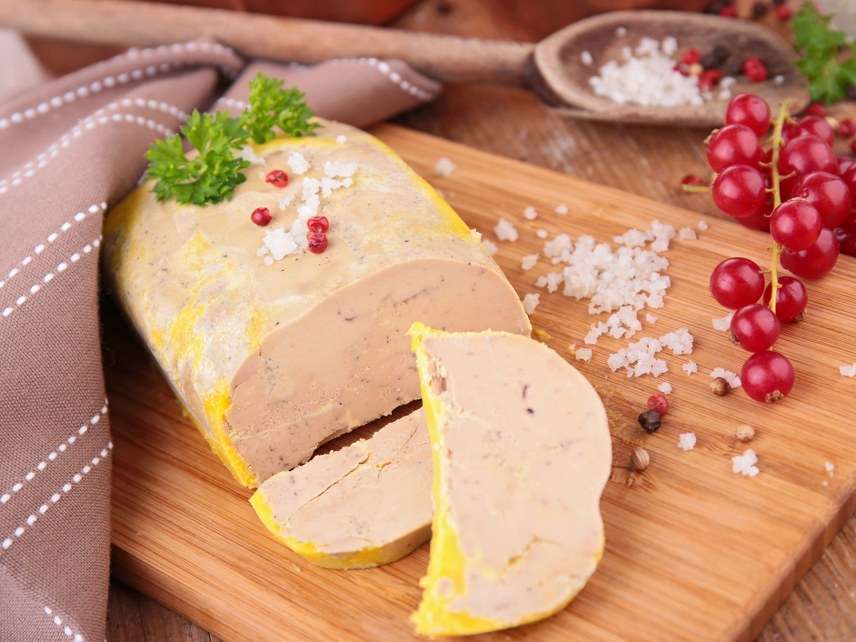Your Right to Eat Foie Gras
The Golden State's regulatory overreach.

Last week, Reason Foundation (the nonprofit that publishes Reason) partnered with the Cato Institute to file an amicus curiae brief with the U.S. Supreme Court in support of the foie gras producers and sellers who are challenging California's awful foie gras ban. In March, the plaintiffs asked the Supreme Court to take up their appeal after the Ninth Circuit Court of Appeals last fall reversed a U.S. District Court ruling that had struck down the ban.
I agree with every single word in the Reason/Cato amicus brief. I should; I wrote it.
Foie gras, a delicacy made from duck or goose liver, is produced using a process known as gavage, which involves fattening a bird's liver by feeding it a mix of fat and grain through a tube inserted into the bird's mouth.
Animal-rights groups, which claim gavage is cruel—there's ample evidence they're wrong about that claim—convinced then-Gov. Arnold Schwarzenegger in 2004 to sign a law banning the force-feeding of a bird for the purpose of fattening the bird's liver. The California law, which regulates farmers not just in California but also in every other U.S. state and every country on the planet, took effect in 2012. The day after it did so, the plaintiffs in the present case sued to overturn it.
I first wrote about foie gras more than a decade ago, when I visited Chicago during that city's own short-lived ban and attended a brilliant, multicourse protest dinner. (Foie gras for dessert? Yes, please.) I wrote about the dinner, ban, and protest in a lengthy piece for Doublethink. One of the paying guests at the dinner, a young chef, told me Chicago's ban had made the city "the laughingstock of the culinary world."
Chicago soon repealed its ban, leaving California alone to carry the dubious mantle of laughingstock, a challenge the state never seems shy to embrace.
California's foie gras ban is deeply flawed. I described many of its issues in 2012 column, and have written extensively on the subject in the years since.
One of the law's very evident problems is that California, despite being more populous and powerful than any other state, is still subject to the federal Constitution. That means it has no authority to regulate interstate commerce. What's more, the federal government does have such power, and it's used that authority to regulate poultry slaughter and sales.
"The foie gras ban isn't unconstitutional primarily because Congress has legislated in this area but because California cannot legislate in this area," I wrote in 2015.
But that's just part of the story.
The possible implications of a state animal-rights law that interferes with interstate and foreign commerce in animal products are already reverberating. Last year, in separate lawsuits, each brought by more than a dozen states, California and Massachusetts were sued over respective animal-rights laws in those states that similarly discriminate against interstate and foreign commerce.
Together, the California and Massachusetts laws target eggs, pork, and beef sales. If it seems as if a couple states can do widespread and lasting damage to livestock farmers, retailers, restaurateurs, consumers, and food freedom across the country, then that's also the reality. That's also what makes this foie gras case so important.
"My farmer clients' ducks are the proverbial canaries in the coal mine," said attorney Michael Tenenbaum, who represents the plaintiffs, in an email to me this week. "If, in spite of the authority given to USDA under principles of federal preemption, the Ninth Circuit continues to let California try to ban fattened duck livers, then there is nothing to stop from any state or city from banning chicken wings—or all meat and poultry products that come from animals raised for food."
Tenenbaum is absolutely right. His point—that the foie gras ban is intended to be a foot in the door for future bans of even the most mundane animal products, from ground beef to chicken wings to pork chops—is correct, even if it's somehow understated.
California's foie gras ban, I write in the amicus brief, "poses a grave challenge to the future of food and agriculture in this country [because it] could undermine our national markets in food and decide ultimately whether all future meat production will be outlawed in America." The case "involves questions concerning federal and state regulation, the national economy, the free market, and food freedom. Given both the essential nature of food in Americans' daily lives and growing regulatory threats to agricultural and food producers, amici believe states should not and may not impose unwarranted burdens on interstate commerce in food."
Manny Klausner, a former editor of Reason, a Reason Foundation co-founder and board member, and attorney, joined me in filing the brief.
"This brief supports Reason's commitment to 'Free Minds and Free Markets,' Klausner told me this week. "And it's particularly satisfying for Reason to file a Supreme Court brief defending liberty that quotes Thomas Jefferson and James Madison's opposition to bans on various types of foods and liquors as 'lunacy' and 'despotic'—and also cites Escoffier, Julia Child, and Thomas Keller!"
Others filing briefs in support of the plaintiffs include the U.S. Poultry & Egg Association, a Canadian food group, the government of France, and 11 U.S. states.
"We believe the Supreme Court will hear the chorus of governments, industries, and defenders of freedom who submitted amicus briefs in support of our petition, and will agree to take up our case," Tenenbaum told me this week.
I'm proud to have had the opportunity to work with Reason Foundation and The Cato Institute and to lend my voice to the chorus urging the Supreme Court to take up this important case.


Show Comments (61)